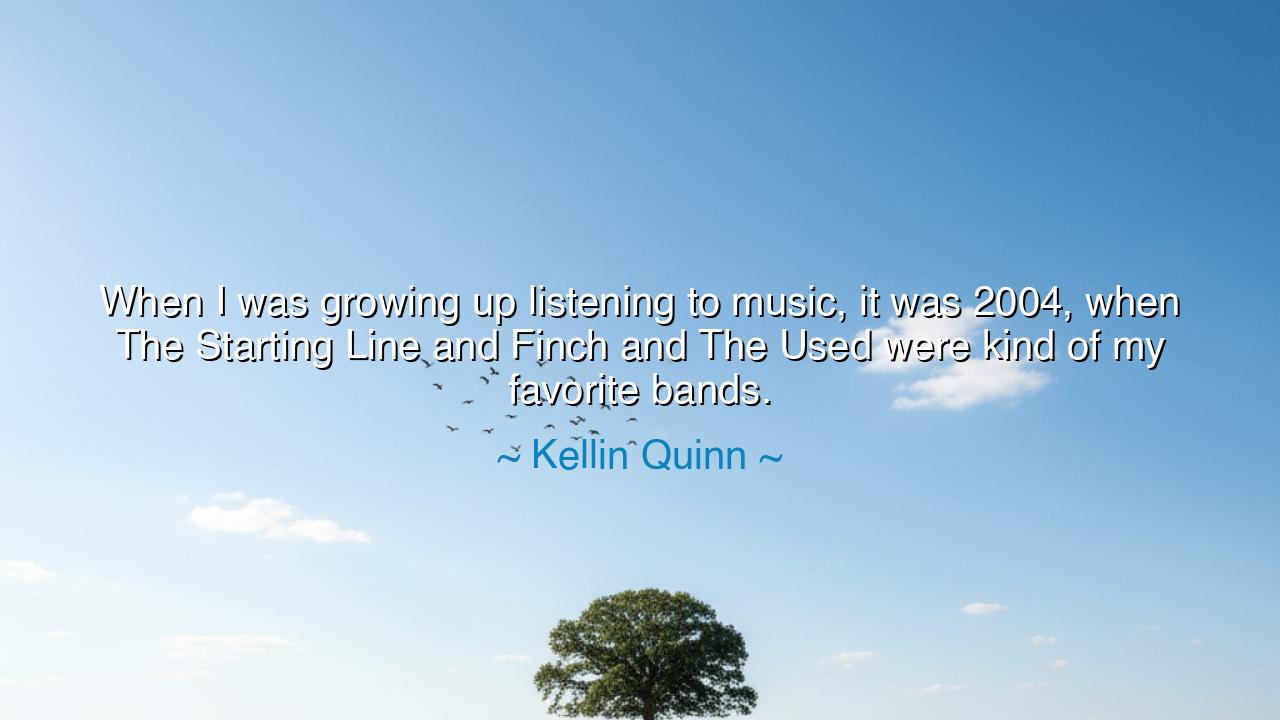
When I was growing up listening to music, it was 2004, when The
When I was growing up listening to music, it was 2004, when The Starting Line and Finch and The Used were kind of my favorite bands.






When the singer Kellin Quinn reflected, “When I was growing up listening to music, it was 2004, when The Starting Line and Finch and The Used were kind of my favorite bands,” he was not merely recalling youthful taste, but bearing witness to the power of music in shaping identity, memory, and destiny. For the songs that fill our youth become more than melodies—they are companions in solitude, mirrors of our struggles, and sparks that ignite the fires of who we are to become. His words reveal how deeply an era of music can bind itself to a soul, marking time not by calendars, but by sound.
The ancients themselves knew this mystery, though they spoke of it differently. They told of the muses, divine spirits who inspired poetry, song, and memory. To invoke the muse was to call upon something greater than oneself, a force that gave meaning to human longing. In the same way, the bands that Quinn recalls—The Starting Line, Finch, The Used—were more than entertainers. To him, and to countless others, they were muses of a generation, voices that gave shape to unspoken feelings of pain, rebellion, hope, and yearning.
This truth can be seen throughout history. Consider the youth of Germany in the 18th century, who found themselves swept up in the storm of Beethoven’s symphonies. To them, his music was not background—it was revolution, emotion made thunder, a force that reflected their own restless spirit. Just as Quinn’s generation found its heartbeat in the raw emotion of post-hardcore and emo bands, so too did Beethoven’s listeners find their souls awakened by sounds that seemed almost too vast for the world. The pattern is the same: music gives each generation its voice.
The year 2004, to Quinn, was more than a number; it was a time defined by sound. The Starting Line’s anthems spoke of longing, Finch of raw energy, and The Used of brokenness transformed into beauty. For many young people then, this music was the lifeline in a turbulent sea of adolescence. It gave them courage to endure, language to express themselves, and a sense of belonging when the world seemed indifferent. What scripture was to the ancients, what myth was to old tribes, these songs became to youth: a shared code of survival and hope.
The meaning of Quinn’s words is thus universal: to grow up with music is to grow up with a guide. The bands he names may belong to a particular time, but the truth they reveal is timeless—each generation finds its soul in sound, and each person is shaped by the music that holds their heart in youth. The personal becomes eternal, and the ephemeral beat of a song becomes the lasting rhythm of a life.
The lesson for us is this: honor the music that shapes you. Do not dismiss your youthful favorites as mere nostalgia, for they were the companions of your growth, the teachers of your soul. Let them remind you of who you were, and how far you have come. And when you find new music that speaks to your present struggles, embrace it, for music is not only a memory but a living force that continues to guide.
Practical wisdom follows. Seek out the songs that lift you when you are weary. Share the music of your youth with others, for in doing so you pass on more than melody—you pass on memory and meaning. Do not be ashamed of the songs that once defined you, for they are the roots of your becoming. And above all, remain open, for the muse may return in new forms, and each season of life has its soundtrack.
Therefore, let us take Kellin Quinn’s words as a testament: the music we love in our youth shapes the soul we carry into the future. Whether it is the anthems of 2004, the hymns of the ancients, or the songs yet to be written, music is the thread that ties us to our past and guides us into tomorrow. For truly, there is no growing up without song.






AAdministratorAdministrator
Welcome, honored guests. Please leave a comment, we will respond soon